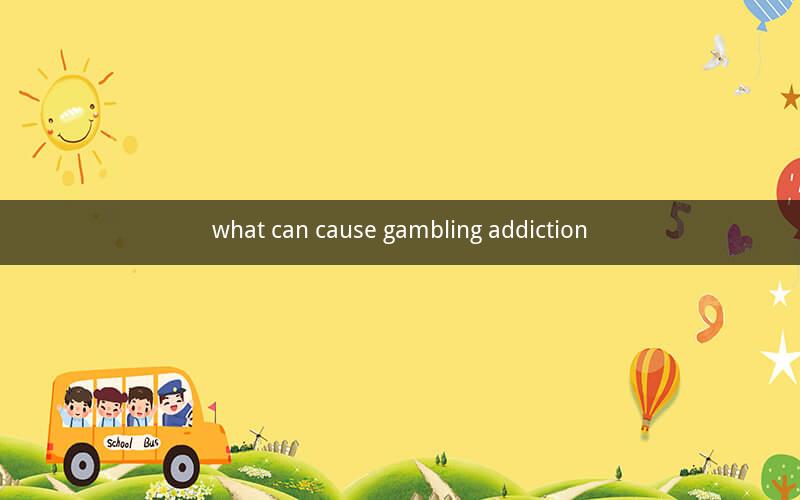
Table of Contents
1. Understanding Gambling Addiction
2. Psychological Factors
3. Social Influences
4. Biological Aspects
5. Environmental Triggers
6. Media and Technology's Role
7. Treatment and Prevention
8. Conclusion
1. Understanding Gambling Addiction
Gambling addiction, also known as gambling disorder, is a condition characterized by an inability to control or stop gambling despite harmful consequences. It affects individuals of all ages, backgrounds, and socioeconomic statuses. To comprehend what can cause gambling addiction, we must explore various factors that contribute to its development.
2. Psychological Factors
Several psychological factors can contribute to the development of gambling addiction. These include:
- Impulse Control Issues: Individuals with poor impulse control may find it difficult to resist the urge to gamble.
- Mood Disorders: People with depression, anxiety, or other mood disorders may turn to gambling as a means of escape or self-medication.
- Personality Traits: Certain personality traits, such as thrill-seeking or sensation-seeking, may increase the risk of developing a gambling addiction.
- Cognitive Dissonance: The psychological discomfort that arises from engaging in behaviors that are inconsistent with one's values or beliefs can lead to compulsive gambling.
3. Social Influences
Social factors can also play a significant role in the development of gambling addiction. These include:
- Peer Pressure: Individuals may be influenced by friends or family members who engage in gambling.
- Cultural Attitudes: In some cultures, gambling may be viewed as a normal and acceptable activity, which can increase the likelihood of addiction.
- Celebrity Endorsements: The promotion of gambling by celebrities and influencers can make it more appealing to young people.
4. Biological Aspects
Research suggests that biological factors may also contribute to gambling addiction. These include:
- Genetic Predisposition: Some individuals may have a genetic predisposition to addiction, including gambling addiction.
- Neurotransmitter Imbalances: Abnormalities in neurotransmitter levels, such as dopamine, may play a role in the development of gambling addiction.
- Brain Structures: Changes in certain brain structures, such as the prefrontal cortex and the nucleus accumbens, may be associated with gambling addiction.
5. Environmental Triggers
Environmental factors can trigger gambling behavior and exacerbate addiction. These include:
- Availability of Gambling Opportunities: Easy access to casinos, online gambling platforms, and lottery terminals can increase the likelihood of gambling.
- Promotional Activities: Marketing and promotional campaigns can make gambling seem more appealing and accessible.
- Economic Stress: Financial difficulties can lead individuals to turn to gambling as a way to alleviate stress or solve financial problems.
6. Media and Technology's Role
The rise of media and technology has had a significant impact on gambling addiction. These factors include:
- Online Gambling: The convenience of online gambling has made it easier for individuals to access and engage in gambling activities.
- Social Media: Social media platforms can promote gambling and normalize risky behavior.
- Virtual Reality: The use of virtual reality in gambling can make the experience more immersive and addictive.
7. Treatment and Prevention
Effective treatment and prevention strategies are crucial in addressing gambling addiction. These include:
- Cognitive Behavioral Therapy (CBT): CBT helps individuals develop coping skills and change negative thought patterns.
- Support Groups: Support groups provide a safe and supportive environment for individuals to share their experiences and receive encouragement.
- Prevention Programs: School-based and community programs can help raise awareness about the risks of gambling addiction and promote responsible gambling.
8. Conclusion
Gambling addiction is a complex condition influenced by a combination of psychological, social, biological, and environmental factors. Understanding these factors can help individuals and society develop effective strategies for prevention, treatment, and support.
---
Questions and Answers
1. Q: What is the primary symptom of gambling addiction?
- A: The primary symptom of gambling addiction is an inability to control or stop gambling despite harmful consequences.
2. Q: Can gambling addiction affect family relationships?
- A: Yes, gambling addiction can have a significant impact on family relationships, leading to stress, conflict, and even breakdown.
3. Q: Are there any genetic factors that contribute to gambling addiction?
- A: Yes, some studies suggest that genetic predisposition may play a role in the development of gambling addiction.
4. Q: Can online gambling be more addictive than traditional gambling?
- A: Yes, online gambling can be more addictive due to its convenience, accessibility, and the immersive experience it offers.
5. Q: What is the most effective treatment for gambling addiction?
- A: Cognitive Behavioral Therapy (CBT) is considered one of the most effective treatments for gambling addiction.
6. Q: Can gambling addiction be cured?
- A: While there is no cure for gambling addiction, it can be effectively managed and controlled with proper treatment and support.
7. Q: Are there any medications that can help treat gambling addiction?
- A: There are no specific medications for treating gambling addiction, but certain medications may be used to manage co-occurring mental health disorders.
8. Q: Can young people develop gambling addiction?
- A: Yes, young people can develop gambling addiction, especially if they are exposed to risky gambling behavior or influenced by peers.
9. Q: Is it possible to prevent gambling addiction?
- A: Yes, prevention strategies, such as education and support programs, can help reduce the risk of developing gambling addiction.
10. Q: How can individuals seek help for gambling addiction?
- A: Individuals can seek help for gambling addiction by contacting support groups, mental health professionals, or by visiting specialized treatment centers.